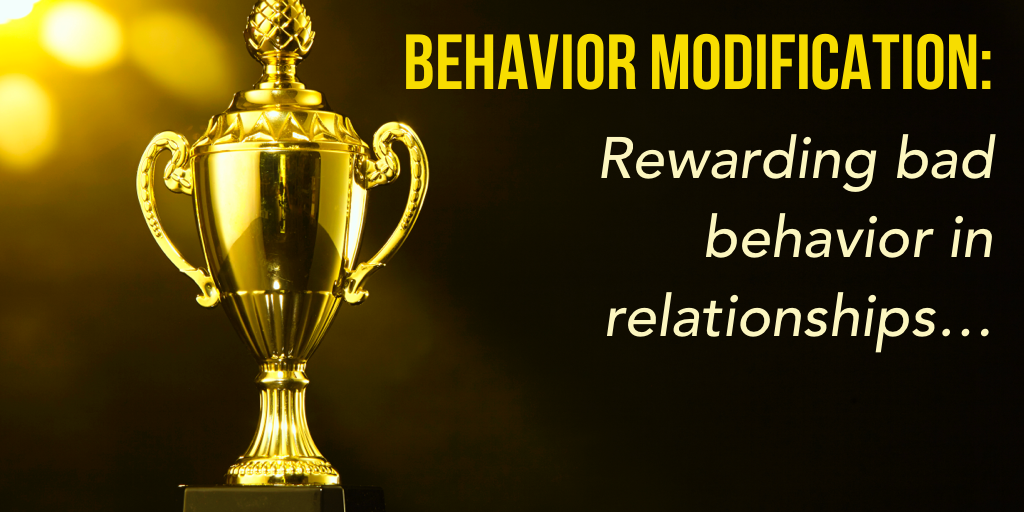Ever stopped to wonder how you ended up with these patterns of behavior that seem to be totally negative, and yet, they are so strong?
Or, ever wondered how someone else is SO effed up in relationships?
Usually through two things:
- Reinforcement
- Punishment
Today we’re going to talk about reinforcement, and how we screw up ourselves and the people around us chasing rewards that positively reinforce negative behaviors.
I recently wrote about mixed signals, and how, if someone is unable to give you a direct positive answer, I suggest you do yourself a favor and step away.
You can read about that here, if you’d like: https://datingkinky.com/blog/dating/mixed-signals-in-dating/
Someone commented on one of my posts:
“so are we supposed to ignore ALL the women who like a man who doesn’t give up, or works and fights for their attention? A lot of women like when a man is persistent……….”
Which illustrates my point perfectly.
Taking the gender out of this, and discussing how this breaks down in human interaction.
First, let me be clear, I was talking about mixed signals. NOT a clear “no.”
That’s important.
Because if someone says, “No,” I don’t care how much they might want pursuit, I say that the rules of consent require the other to drop the topic/pursuit/effort/whatever.
Period.
Outside of a clear “No,” and in the realm of unclear communication or mixed signals, then we can address these:
- doesn’t give up
- works for their attention
- fights for attention
- persistence
I do like people who are persistent, and don’t give up WHEN I have not withdrawn consent, or when we are playing flirting games.
Absolutely I do.
Pet won me exactly that way.
However, I was positive (if not effusive—although he might argue that I was VERY effusive) throughout. I just wasn’t sure that what he was offering was something I wanted at that time, and I reserved judgment.
7 1/2 years later, still humbly grateful he was right.
Let’s talk about working for attention. To me, this is teetering on the edge. I do love people who put in the effort. Most people I know do. After all, when someone puts in effort, it’s flattering. It feels good to know that someone thinks you are WORTH that effort.
So, from the standpoint of the person throwing mixed signals, this is a win, whether they actually want whatever the effortful person is trying to get.
If we turn that around, though, to the person putting in the effort, then we can see where negative patterns of behavior and reinforcement.
- By putting in work and getting attention, they are being positively reinforced—even if it’s a false reinforcement, because it’s not actually going to go anywhere. After all, the person has never been clear.
- They are also in turn positively reinforcing the person they are working for, by giving them rewards for being ambivalent.
Let me say that again:
They are positively reinforcing the person they are working for, by giving them rewards for being ambivalent.
Rewarding them for not giving affirmative consent, for holding back for “ a better deal,” more effort, and so on.
And let’s be real, here—many people are addicted to the chase, and will stop putting in much effort as soon as they are given full consent.
With me so far?
Great.
Now, let’s dig a bit deeper, and look beyond the short term.
What does it mean to the person who is offering mixed signals in their future relationships?
- It may mean that they subconsciously believe that by never being direct, they will get more out of their life and love.
- They may even meet one (or dozens) of those who live for the chase (because they are attracted by that behavior), and the few times they did give in and were direct in a moment of weakness, the good attention stopped, which reinforced NOT being direct, ever.
- They will always judge others by the extremes of courtship rituals and desperate measures, rather than by sincerity.
And those making all that effort to win someone?
- They will believe that ALL relationships take SO MUCH EFFORT.
- They will think that indirectness is normal (because that’s what they find themselves attracted to), and that people who are direct are just being indirect in a different way (or lying), and will always be trying to read between the lines.
- In a weird twist of the mind, they will think anyone who does not make them put in all that effort is not WORTH all that effort.
- They will show the current relationship that they get positive effort when they don’t give in. That making them work for every bit of attention is the best way to get their A-game, creating a relationship of competition between partners, instead of collaboration.
- AND, they will train every single person in every relationship they have moving forward (until they change their patterns) that being indirect is GOOD, because that is what makes them positively respond.
Do you see how these patterns of behavior can spread like a virus?
And they can infect otherwise direct people who might really like this person, and who will fit their pattern (without realizing), because that is what makes them happy.
And then, you have someone new who believes that being indirect gets GOOD THINGS and effort in relationships, because it “worked” for a while.
Wow.
And that’s just ONE behavior.
And all I’m going to say about fighting for attention is that that’s a level of worse.
But here’s the really CRAZY part:
One you get caught in these patterns, they become a default world view, and every time you run a pattern, in reinforces and strengthens it to the point where some people refuse to believe that relationships exist without all of these negative behaviors.
Or even that they could.
So, they are trapped in a negative cycle, thanks to unwitting behavior modification from the wrong rewards.
And that is crazy hard to break out of.
And scary AF, because it means learning a whole new way of interacting. That may or may not work, and that is, at best unfamiliar and uncomfortable.
And I like to say that the first step in any behavior modification is modifying our own behavior (because we have to know what we want and what we want to reward).
So, taking all this in, let’s ask ourselves:
- Do I value the thrill of the chase more than the results of catching?
- Do I really want to set up a relationship type where I have to work and fight constantly to prove my worth and get positive attention?
- Do I really want to have to chase someone forever?
- Do I want to always wonder where people stand with me?
Or:
- Do I want to be direct and reward directness in my relationships with others?
- Do I want to be able to choose the effort I put in from a place of positivity and intention, rather than from a place of desperation?
- Do I want to KNOW that someone wants me and my attention, and feel secure in that?
And more generally:
- What kinds of negative behavior have I rewarded and helped to perpetuate in my own relationships?
- What positive behaviors have I ignored or even punished in my relationships?
(I’m willing to do a second piece on various other negative behaviors we accidentally reward, if y’all would like that, before I move on to punishing positive behaviors in relationships and killing them.)
smiles










